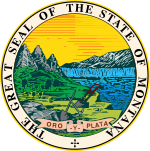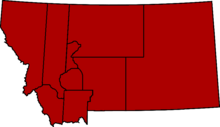This article needs additional citations for verification. (February 2022) |
| Year | Republican | Democratic | Third party(ies) | |||
|---|---|---|---|---|---|---|
| No. | % | No. | % | No. | % | |
| 2020 | 343,602 | 56.92% | 244,786 | 40.55% | 15,286 | 2.53% |
| 2016 | 279,240 | 55.65% | 177,709 | 35.41% | 44,873 | 8.94% |
| 2012 | 267,928 | 55.30% | 201,839 | 41.66% | 14,717 | 3.04% |
| 2008 | 243,882 | 49.49% | 232,159 | 47.11% | 16,709 | 3.39% |
| 2004 | 266,063 | 59.07% | 173,710 | 38.56% | 10,672 | 2.37% |
| 2000 | 240,178 | 58.44% | 137,126 | 33.36% | 33,693 | 8.20% |
| 1996 | 179,652 | 44.11% | 167,922 | 41.23% | 59,687 | 14.66% |
| 1992 | 144,207 | 35.12% | 154,507 | 37.63% | 111,897 | 27.25% |
| 1988 | 190,412 | 52.07% | 168,936 | 46.20% | 6,326 | 1.73% |
| 1984 | 232,450 | 60.47% | 146,742 | 38.18% | 5,185 | 1.35% |
| 1980 | 206,814 | 56.82% | 118,032 | 32.43% | 39,106 | 10.74% |
| 1976 | 173,703 | 52.84% | 149,259 | 45.40% | 5,772 | 1.76% |
| 1972 | 183,976 | 57.93% | 120,197 | 37.85% | 13,430 | 4.23% |
| 1968 | 138,835 | 50.60% | 114,117 | 41.59% | 21,452 | 7.82% |
| 1964 | 113,032 | 40.57% | 164,246 | 58.95% | 1,350 | 0.48% |
| 1960 | 141,841 | 51.10% | 134,891 | 48.60% | 847 | 0.31% |
| 1956 | 154,933 | 57.13% | 116,238 | 42.87% | 0 | 0.00% |
| 1952 | 157,394 | 59.39% | 106,213 | 40.07% | 1,430 | 0.54% |
| 1948 | 96,770 | 43.15% | 119,071 | 53.09% | 8,437 | 3.76% |
| 1944 | 93,163 | 44.93% | 112,556 | 54.28% | 1,636 | 0.79% |
| 1940 | 99,579 | 40.17% | 145,698 | 58.78% | 2,596 | 1.05% |
| 1936 | 63,598 | 27.59% | 159,690 | 69.28% | 7,224 | 3.13% |
| 1932 | 78,078 | 36.07% | 127,286 | 58.80% | 11,115 | 5.13% |
| 1928 | 113,300 | 58.37% | 78,578 | 40.48% | 2,230 | 1.15% |
| 1924 | 74,138 | 42.50% | 33,805 | 19.38% | 66,480 | 38.11% |
| 1920 | 109,430 | 61.13% | 57,372 | 32.05% | 12,204 | 6.82% |
| 1916 | 66,750 | 37.57% | 101,063 | 56.88% | 9,866 | 5.55% |
| 1912 | 18,512 | 23.19% | 27,941 | 35.00% | 33,373 | 41.81% |
| 1908 | 32,333 | 46.98% | 29,326 | 42.61% | 7,163 | 10.41% |
| 1904 | 34,932 | 54.21% | 21,773 | 33.79% | 7,739 | 12.01% |
| 1900 | 25,409 | 39.79% | 37,311 | 58.43% | 1,136 | 1.78% |
| 1896 | 10,509 | 19.71% | 42,628 | 79.93% | 193 | 0.36% |
| 1892 | 18,871 | 42.44% | 17,690 | 39.79% | 7,900 | 17.77% |
| Elections in Montana |
|---|
 |

Montana became a territory May 28, 1864 and the first delegation created nine counties: Beaverhead, Big Horn (renamed Custer in 1877), Chouteau, Deer Lodge, Gallatin, Jefferson, Edgerton (renamed Lewis and Clark in 1867), Madison, and Missoula. Montana became a state on November 8, 1889.
Montana has a history of voters splitting their tickets and filling elected offices with individuals from both parties. Through the mid-20th century, the state had a tradition of "sending the liberals to Washington and the conservatives to Helena". Between 1988 and 2006, the pattern flipped, with voters more likely to elect conservatives to federal offices. There have also been long-term shifts in party control. From 1968 through 1988, the state was dominated by the Democratic Party, with Democratic governors for a 20-year period, and a Democratic majority of both the national congressional delegation and during many sessions of the state legislature. This pattern shifted, beginning with the 1988 election when Montana elected a Republican governor for the first time since 1964 and sent a Republican to the U.S. Senate for the first time since 1948. This shift continued with the reapportionment of the state's legislative districts that took effect in 1994, when the Republican Party took control of both chambers of the state legislature, consolidating a Republican party dominance that lasted until the 2004 reapportionment produced more swing districts and a brief period of Democratic legislative majorities in the mid-2000s.
Montana has voted for the Republican nominee in all but two presidential elections since 1952.[2] The state last supported a Democrat for president in 1992, when Bill Clinton won a plurality victory. However, since 1889 the state has voted for Democratic governors 60 percent of the time, and Republican governors 40 percent of the time. In the 2008 presidential election, Montana was considered a swing state and was ultimately won by Republican John McCain by a narrow margin of two percent.
In a 2020 study, Montana was ranked as the 21st easiest state for citizens to vote in.[3]
- ^ Leip, David. "Presidential General Election Results Comparison – Montana". US Election Atlas. Retrieved January 3, 2023.
- ^ Montana 2012 Election 2013.
- ^ J. Pomante II, Michael; Li, Quan (15 Dec 2020). "Cost of Voting in the American States: 2020". Election Law Journal: Rules, Politics, and Policy. 19 (4): 503–509. doi:10.1089/elj.2020.0666. S2CID 225139517. Retrieved 14 January 2022.
